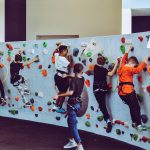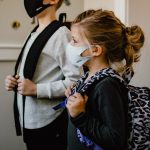By Lucy Lawrence
Photo by Honey Yanibel Minaya Cruz on Unsplash
While the exterior of Skagit Valley College may seem like a normal community college experience, Skagit has some unique graduation requirements that make an education there a bit different than a more traditional community college experience.
One of Skagit’s Associate in Arts Direct Transfer Agreement is three physical education credits.
One of the physical education requirements is PE 100 titled Wellness For Life. This class covers the basics in both physiological and psychological health. It puts emphasis on nutrition principles, fitness parameters, stress management and how to incorporate healthy practices in everyday life. In addition to PE 100, two other activity classes are required. Some of the course offerings at Skagit include strength/cardio training, beginning tennis, fitness through yoga, volleyball, self-defense, martial arts, kickboxing, Pilates, swing dancing, kayaking, and other general fitness classes. Through this requirement, Skagit encourages students to adopt a healthy lifestyle that will benefit them through life, not just throughout their education. This is rare for a community college and surrounding colleges like Everett Community College and Whatcom Community Colleges do not employ these principles in their graduation requirements. Similar in its uniqueness, Skagit also requires students pursing Associates in Arts Direct Transfer Degrees to complete a combination of two of either learning communities or integrated learning experiences.
According to Matt Scammell, a professor and the District Integrative Learning Coordinator at Skagit, requiring these experiences stems from Skagit’s five General Education Outcomes. These are Think, Quantify, Communicate, Integrate and Engage. Learning communities and integrated experiences intentionally satisfy the Integrate part of the outcome. Learning communities are two classes taught in tandem with each other so that students can explore collaborative learning in large groups and with students who may not be pursuing the same degree. Learning community class combinations range from closely related to completely unrelated, but professors make the subjects somehow related. These communities not only relate subjects that not easily related but do so in witty and smartly titled ways from the minds of the professors teaching them.
One of the learning communities available for summer quarter of 2021 is titled Western Washington Field Study and combines the classes PE 100, Wellness For Life and PE 167, Intro to Kayaking. This learning community is a trip focused on exploring the San Juan Islands with the application of physical fitness through kayaking and hands-on experience with kayaking. The class runs from July 6-20 and students are able to travel from different islands. If students are not interested in this type of learning community, there are many other more traditional, classroom taught communities to join. Another learning community that students are able to take this fall quarter is titled No Me Digas, which translates to You Don’t Say in English from Spanish. The class combines SPAN 121, Intro to Spanish and CMST 205, Interculture Communication. The class connects the Spanish language and culture to practical communication theory skills. Another learning community offered this fall is called Stats on the Mind. This learning community allows students to take MATH 148, Introduction to Statistics in tandem with PSYC 100, General Psychology.
This class focuses on teaching students to be better thinkers and covers the basics for both of these subjects. The class analyzes topics such as neuroscience, personality development and social influences and uses statistics to answer some of the questions in related fields. The class applies statistics into realistic psychological situations that prepare students to be able to correctly apply their gained knowledge of statistics. Similar to learning communities, Skagit also offers students who are dedicated to a certain field of study to take seminars with other students in their desired field. These seminars usually consist of two credits rather than the learning communities which can be up to 10 credits. An integrative experience seminar that is offered to students this winter is a biology seminar. This seminar is intended for science majors and approaches issues in biology in application with technology, ethics, politics, and culture.
Another integrative experience offered is a seminar titled Current issues in Ecology offered Spring Quarter of the 2021-2022 school year. The seminar explores science behind ecological topics and addresses societal impacts, consequences of ignoring issues, and attitudes and societal values towards various socioeconomic groups. This class uses both literary research and presentations for students to better communicate their ideas to the rest of the class and faculty. All of these different course offerings from Skagit provides students with the opportunities to not only earn their degrees, but the ability to explore either more realistic situations in their desired career or other interests not in their intended field of study. Scammell notes that these experiences are beneficial to students because they are taught by multiple professors each bringing different skills, ideas and perspectives into the classroom. Taking these classes in tandem also allows faculty members to communicate to lessen a student’s workload. Skagit uses these tools to make sure that students have a well-rounded education aside from just traditional classes.






